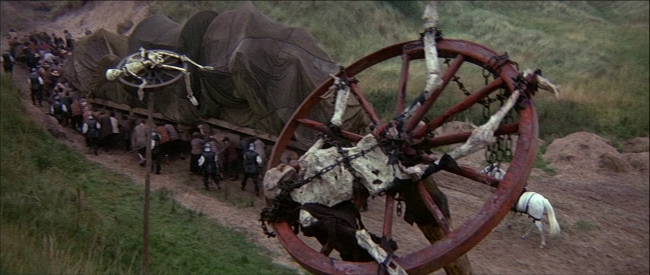
No matter how you look at it, an entire convent losing their minds due to sexual frustration over a priest does not look good for the Catholic Church. But there are different ways fictional adaptations can address the infamous 17th century Loudun possessions. Ken Russell's 1971 film The Devils, based partly on a book by Aldous Huxley, would come across as a nihilistic depiction of human beings as compulsively beastly if it weren't for a particularly graceful performance from Oliver Reed as the victim and centre of the storm, Father Grandier. More entertaining spectacle than contemplative or horrific, the film is best described using Grandier's word in the film for the proceedings depicted; a circus.
The film opens with Cardinal Richelieu (Christopher Logue) straining to maintain equanimity while watching Louis XIII (Graham Armitage) perform as Venus in a decadent masque.

Meanwhile, Grandier is in charge of the walled town of Loudun which is currently beset by plague. Richelieu is in the process of having the King remove local authorities like Grandier in order to consolidate all ecclesiastical power in the Cardinal. But Richelieu can't budge the King on Grandier due to a promise the King made to the late governor.

The film makes it clear the 1630s were not a good time to be a Protestant in France--in one particularly memorable scene, the King uses Protestants dressed as crows for target practice--but another reason Grandier is a nuisance to Richelieu and his subordinates is his tolerance for Protestants, possibly because Grandier himself routinely breaks his vow of celibacy without the slightest sense of shame. This is one of the things that also drives Sister Jeanne of the Ursuline convent crazy.

She's played by Vanessa Redgrave, a fine performance but not as much of a stand out as you might expect. As Baron de Laubardemont (Dudley Sutton), Richelieu's chief agent in the area, exploits the mad nuns to concoct a narrative about Grandier having a pact with Satan to possess the nuns, the antics of the supposedly possessed women and a witchhunter named Barre (Michael Gothard) easily surpass the court of Louis XIII in apparent hedonistic abandon, made all the more extreme for the hypocrisy involved which starts to look like method acting fetish role play.

This spectacle is the heart of the film and Russell gets many very striking images out of it. If it weren't for Reed's performance, there'd be little excitement left over for Grandier's scenes. That his persistent dignity in the face of all this remains captivating is a tribute to Reed. Much of his scenes later in the film bring to mind Dreyer's Joan of Arc.

But the broadness of the undisguised mercenary or loony quality of everyone else in the film prevents it from being an especially thoughtful examination of the incident. A better film tackling the topic is the great 1961 Polish film Mother Joan of the Angels which moves the action to Poland and takes place in the aftermath. It's a much eerier and troubling rumination on spiritual belief and commitment. But Russell's film is certainly a good time.

No comments:
Post a Comment